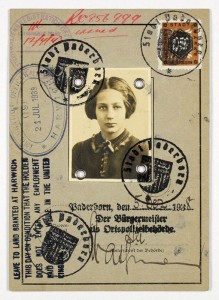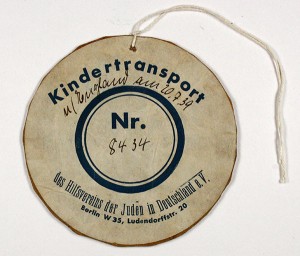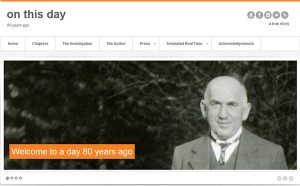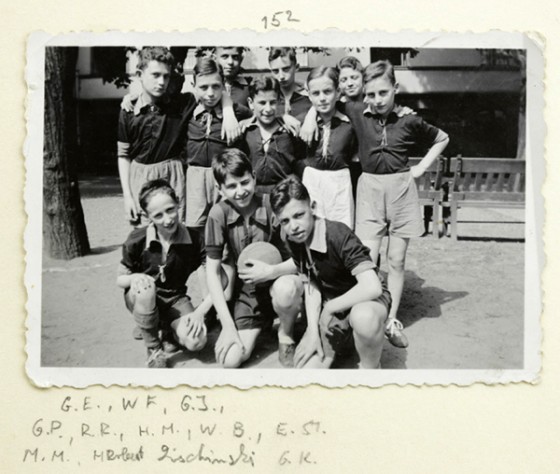
Beate Rose’s childhood passport
© Jewish Museum Berlin, donated by Beatrice Steinberg
75 years ago today, on 2 December 1938, the first of the Kindertransport rescue missions arrived in England. Beatrice Steinberg (née Beate Rose), a benefactor of the Jewish Museum Berlin, was among the last of the Jewish children to be saved in this way, by mass evacuation from Nazi-occupied territories. In her memoirs, which are held in our archives, she recalls her departure from Germany in the summer of 1939:
“My mother took me to the train, which turned out to be one of the last Kindertransporte to England […]. I was so excited that I rushed up the station steps without even saying goodbye to my mother. She called me back. We gave each other a hug and a kiss, then I boarded the train. I stood at the window and we waved goodbye. That was the last time I ever saw her.”

Beate Rose’s number tag from the “Kindertransport” rescue mission
© Jewish Museum Berlin, donated by Beatrice Steinberg
For Beatrice, only twelve years old at the time, the trip was an adventure; for her parents, the decision to let her go off alone, into the unknown, must have been made in great despair. The mass evacuation of children was launched three weeks after the November pogrom. Beate’s father was a prisoner in Buchenwald concentration camp at the time. Like hundreds of thousands of Jewish men and women, her parents hoped to leave Germany as soon as possible. But which country would open its borders to the mass of refugees? Visa restrictions and a bewildering amount of red tape made emigration a protracted and arduous undertaking. → continue reading
Since January 30, 2013 you can find documents and photographs from our archival collections and those of the Leo Baeck Institute in our Online Showcase. We are, of course, not the only ones producing work online using historical sources as witnesses to the time of National Socialism. I have looked around and would like to use this post to make some recommendations:
 An impressive example is Torkel S. Wächter’s project. The Swedish writer arranged together 32 postcards when he decided to investigate the history of his German-Jewish family. His father Walter Wächter fled to Sweden in 1938 and began regularly receiving postcards from his parents, who had remained in Germany. Torkel S. Wächter created the internet project www.32postkarten.com out of them and in 2010/2011 – 70 years later, to the day, after the card was written – he published these last life testimonies of his grandparents, annotated and placed in historical context. Wächter is now again presenting his longstanding engagement with his family’s history as an online project: www.onthisday80yearsago.com. In a literary form – with the aid of letters, notes from journals, and official documents, he tells the story of his grandfather Gustav Wächter, a tax officer who lost his job due to his Jewish heritage and office scheming. Torkel S. Wächter published the chapters from January 30 to July 2, 2013 in “simulated real-time”, as he calls it, rather like a re-enactment of the events of 80 years ago. A serialized novel, a weblog, and memory itself merge together harmoniously here. → continue reading
An impressive example is Torkel S. Wächter’s project. The Swedish writer arranged together 32 postcards when he decided to investigate the history of his German-Jewish family. His father Walter Wächter fled to Sweden in 1938 and began regularly receiving postcards from his parents, who had remained in Germany. Torkel S. Wächter created the internet project www.32postkarten.com out of them and in 2010/2011 – 70 years later, to the day, after the card was written – he published these last life testimonies of his grandparents, annotated and placed in historical context. Wächter is now again presenting his longstanding engagement with his family’s history as an online project: www.onthisday80yearsago.com. In a literary form – with the aid of letters, notes from journals, and official documents, he tells the story of his grandfather Gustav Wächter, a tax officer who lost his job due to his Jewish heritage and office scheming. Torkel S. Wächter published the chapters from January 30 to July 2, 2013 in “simulated real-time”, as he calls it, rather like a re-enactment of the events of 80 years ago. A serialized novel, a weblog, and memory itself merge together harmoniously here. → continue reading
This evening a game between the Israeli and Norwegian teams will kick off the Under-21 European Football Championship in Netanya. Participating in the opening match in their home country will be something very special for the Israeli players.
Since I am a big soccer fan, this European Cup provided me with the impetus to take a closer look at what the Jewish Museum’s collection has on the subject of soccer. In our online display I discover a “Short History of Jewish Football,” and in our collection data bank I find further objects that awaken my curiosity. A photograph from the year 1936 or 1937 particularly appeals to me. I find it fascinating that soccer was already in the 1930s something boys loved to play. In the picture stands (last row, center) the young Walter Frankenstein, born in 1924, together with his soccer team:

The soccer team of Auerbach’s Orphanage from 1936 or 1937. Gift of Walter Frankenstein (last row, center). Photographer unknown.
© Jewish Museum Berlin, photo: Jens Ziehe
All the boys in the picture were inhabitants at that time of Auerbach’s Orphanage in Berlin’s Schönhauser Allee. → continue reading



